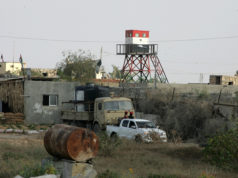Activists in Cairo on Monday criticized an agreement signed by thirteen political parties and Egypt’s interim military rulers over the weekend. The agreement was made in order to avoid an election boycott after thousands took to the streets Friday, threatening to forgo voting unless the interim army leadership changed an election law to allow parties to field candidates both on party lists and for seats allocated to individuals.
Egypt’s first parliamentary elections since ousting Hosni Mubarak is set to take place on November 28, when citizens will vote to fill the People’s Assembly, Egypt’s lower house of parliament. Voting for the Shura Council, the upper house, will take place two months later. A committee with members from both bodies will then be appointed before April 2012 and will be charged with drafting a new constitution within one year.

Egyptian protesters in Cairo’s Tahrir Square on Sept. 30th. |
Once the document is completed, presidential elections are to be scheduled, although there is no set time for that to happen after the constitution’s completion — meaning, military rule over the country could continue past April 2013. Presidential hopefuls have publicly criticized this timetable under the pretense that it slows Egypt’s transition to civilian rule.
In response to the boycott, generals also agreed to review the controversial expanded emergency law that allows authorities to detain people without official charges. Lifting the emergency law was a principal demand of the Egyptian uprising against Mubarak. Military chiefs said they would now consider narrowing its scope and ending military trials for civilians. According to human rights organizations, 12,000 civilians have been tried in military courts and jailed since the revolution.
While the weekend’s agreement was meant to appease critics, it seems to have further agitated activists who believe the deal offers only minor concessions, fails to make promises, and in short, does not go far enough. Egypt, a great stakeholder in the “Arab Spring,” has much to gain if only it can find a way to smoothly transition from military to civilian rule. But, as of now, among the mayhem, it seems to currently lack the patience, order, and cohesiveness necessary for progress.





